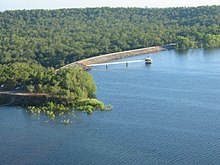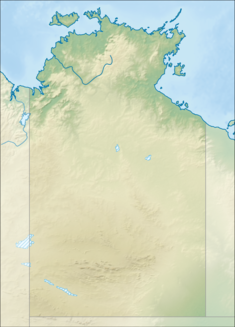The Darwin River Dam is in Australia's Northern Territory on the Darwin River. The water catchment it contains is the major source for the city of Darwin.
| Darwin River Dam | |
|---|---|
 | |
Location of the Darwin River Dam in the Northern Territory. | |
| Location | Darwin River, Northern Territory, Australia[1] |
| Coordinates | 12°49′47″S 130°58′19″E / 12.829856°S 130.971921°E |
| Purpose | Water supply |
| Status | Operational |
| Opening date | 1972 |
| Dam and spillways | |
| Impounds | Darwin River |
| Dam volume | 265,500 ML (58.4×109 imp gal; 70.1×109 US gal) |
The dam can hold up to 259,000 megalitres of water (265,500 ML (58.4×109 imp gal; 70.1×109 US gal)) which is half the volume in Sydney Harbour or eleven times bigger than the Manton Dam.[2]

The Darwin River Dam is an embankment-type dam. It is ungated with no spillway regulation possible. The dam relies on the annual wet season to be replenished. Toward the end of this season, the dam sometimes overflows. Most years spilling occurs, and is considered normal. Depending on rainfall amounts, this overflow can last from days to weeks.[3]
The water in this dam is considered to be one of the most pristine on Earth. In order to preserve this quality, the catchment and reservoir policy prohibits recreational use with substantial penalties imposed for trespassing. Also, there is no Cabomba, an aquatic weed genus that can affect water quality.[4]
The dam was formally opened by William McMahon (Prime Minister at the time) on 29 June 1972. The cost of construction was $9 million.[2]
See also
editReferences
edit- ^ "Place Names Register Extract for "Darwin River Dam" (Reservoir)". NT Place Names Register. Northern Territory Government. Retrieved 16 April 2019.
- ^ a b Department of Land Resource Management, Northern Territory Government. "Darwin Water Supply". nt.gov.au. Archived from the original on 30 September 2015.
- ^ "Darwin River Dam Levels". powerwater.com.au.
- ^ The facts Darwin River Dam - A pristine environment - July 2008
External links
edit- Media related to Darwin River Dam at Wikimedia Commons
- Information about current water levels in the Darwin River Dam catchment
